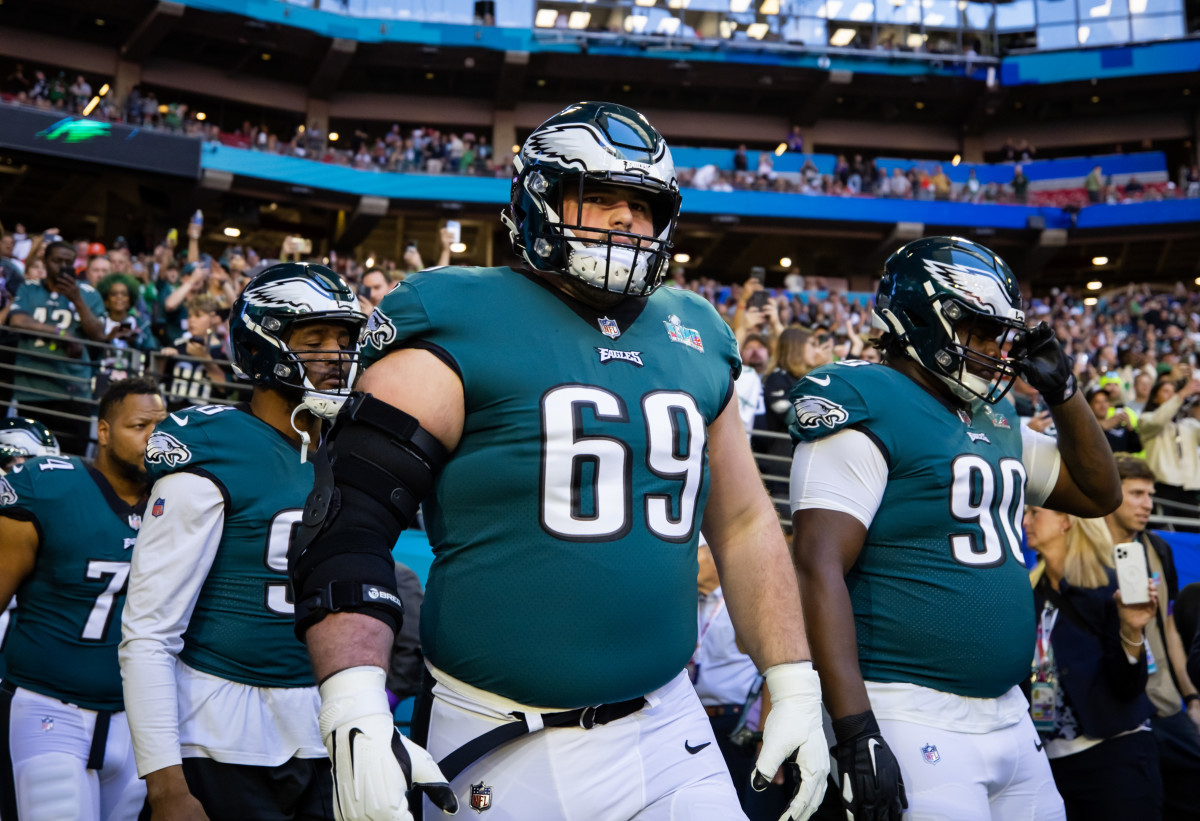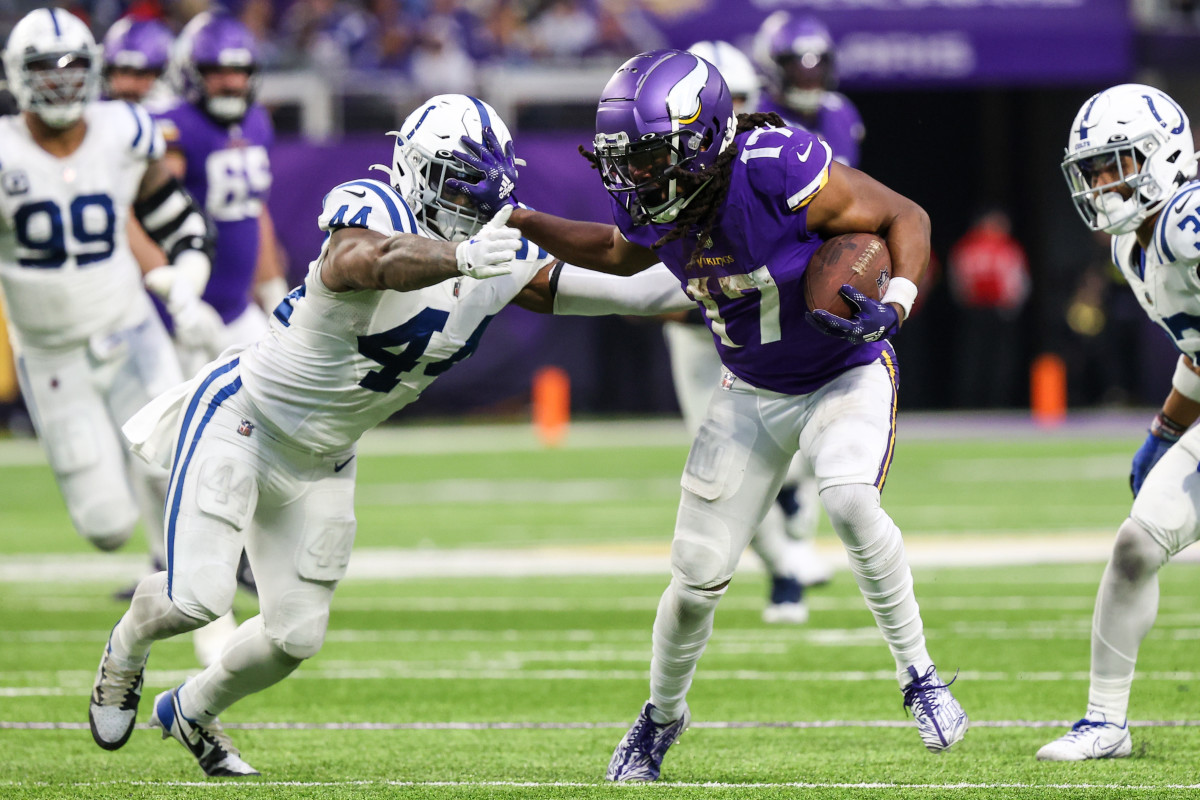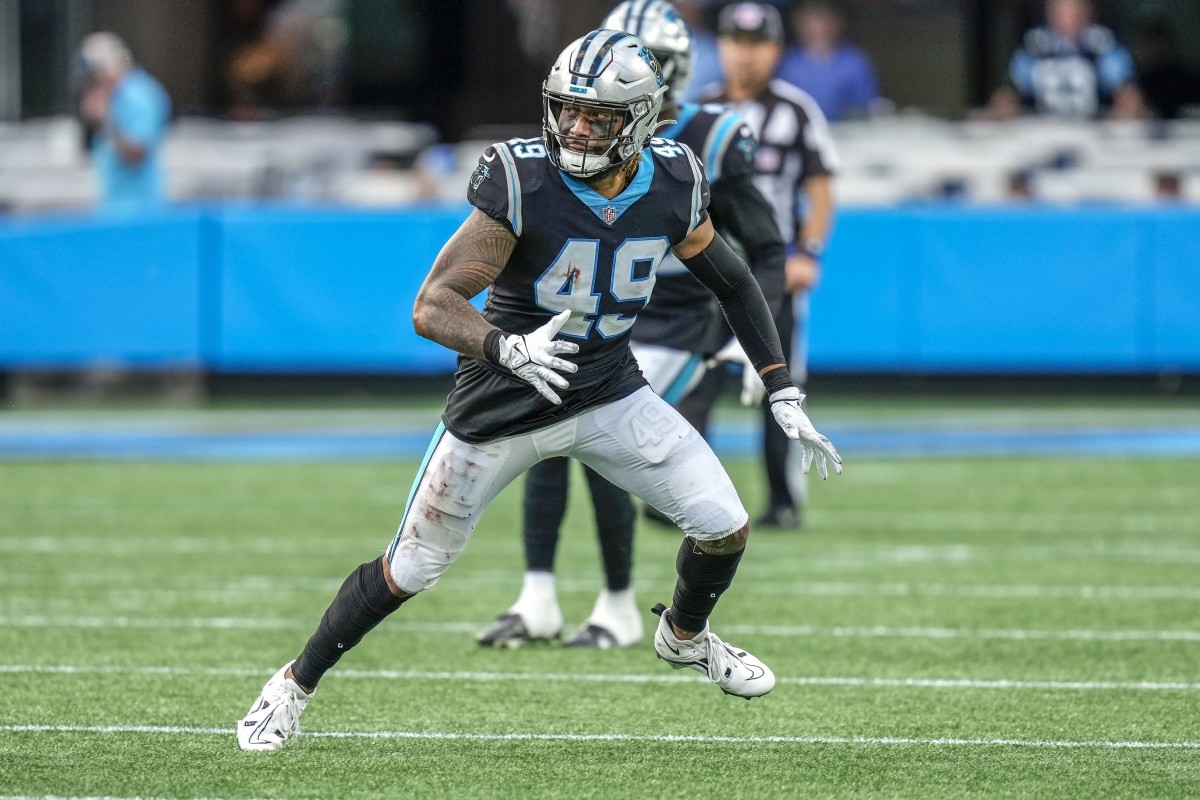Every NFC Team’s Most Underrated Player Heading Into 2023

I’ve always admired NFL players who pass on the bait when asked about their “rating” or “legacy.” While the latter is at least a little dependent on their own overall actions, almost everything about how a player’s career is perceived is out of their control. If a teammate blows coverage and they get docked with a touchdown allowed on their own statistics, are they going to risk being labeled as “petty” as well by pointing that out?
So it is with that trepidation in mind we present the second half of our most underrated players list. Underrated according to whom? Well, me, one of those nefarious types who assign nebulous terms like rating and legacy to people. As I mentioned in the AFC post, some of this is just waving my arms and saying, “I had no idea how good this guy was until I dug into it more.” Some of this is coaches I speak to asking, “Why doesn’t anyone talk about this guy?” This isn’t an exact science, but instead, it’s a fun way to look at some players, both known and unknown, who have a major impact on the games we watch every week.
Washington Commanders
Montez Sweat, edge
Over on the AFC side, I listed Broncos corner Patrick Surtain II with the caveat that of course you’ve heard of Patrick Surtain II … but I think he might be the best cornerback in the NFL. Unless he’s universally considered as such, that makes him underrated to me. The same can be said for Sweat. He was a first-round pick in 2019, not exactly under the radar. But as a finisher, he might be one of the five best edge rushers in the NFL. Hyperbolic? I don’t think so. Remember last year when he took a Titans blocker and threw him into Ryan Tannehill like he was a medicine ball? Or the sack he had against the Eagles where he split Jason Kelce and Lane Johnson, arguably two of the five best offensive linemen in the NFL? Sweat is worth keeping an eye on as he hits his fifth-year option and the Commanders (theoretically) prepare to separate from Chase Young. He could end up making $25 million to $27 million per season next year.
Dallas Cowboys
Donovan Wilson, safety
Last year, we tabbed Malik Hooker as Dallas’s most underrated player. This year, it’s a player in the same position room. I don’t know how Dan Quinn gets his safeties to play like every down is their last, but Wilson and Hooker have such an edge to their game. Watch Wilson against the Bengals last year and you’ll find him toppling Joe Mixon in the backfield or dragging down Hayden Hurst in the open field to save a first down. But Wilson’s true value may be as a pass rusher. On 30 designed blitzes last year, he had five sacks. In a division with mostly semimobile or nonmobile quarterbacks, the ability to both create additional pressure and wrangle more athletic quarterbacks like Jalen Hurts is valuable. This, on top of 101 tackles with a miss percentage below 10% and an opposing quarterback completion percentage of 51%. For a player on a $7 million per year contract, that’s eye-opening value.

Philadelphia Eagles
Landon Dickerson, guard
The Eagles are a bit of an offensive line institution. As we mentioned a few paragraphs ago, they have two of the five best in the NFL. Kelce and Johnson may each be a top-10 center and right tackle of all time, respectively. Add in Jordan Mailata, a walking, football-playing version of Ben Grimm, and there isn’t a lot of room for adulation remaining. Still, it’s impossible not to notice how much better Dickerson got from his rookie season in 2021 to his second year. Two of the Eagles’ most frequently used running lanes were the one between Dickerson and Kelce and another between Dickerson and Mailata, the latter of which was one of the most successful gaps in the NFL in terms of yards per attempt.
New York Giants
Evan Neal, right tackle
This will probably be a wildly unpopular take, though in similar fashion I predicted the rise of Garett Bolles a few years ago. Bolles, like Neal, was a highly drafted tackle who struggled early on in his career. Pro Football Focus has Neal rated as the second-worst tackle in the NFL. By virtue of this alone, I would argue that it’s easy to prove he is underrated. I don’t think there are 80 tackles in the NFL who are better than Neal. If you watch the playoff game against the Eagles, he was a guy taking on Philadelphia’s best pass rusher on the opening drive with no tight end help. The Giants were protecting Neal a bit via their play call choices, but no differently than the Eagles were protecting Hurts, and they have two elite-level tackles. Neal, just before his knee injury in Week 7, was faster off the line and more willingly physical at the point of attack. I don’t think he’s as much of a liability as he’s being labeled.
Chicago Bears
Entire offensive line and offensive coordinator
Braxton Jones is probably the choice, simply because he was a rookie fifth-round pick who anchored a young quarterback’s blind side comfortably like a seasoned professional, and if you’d like me to list one person, Jones can serve as one. But there’s a major point to be made about coaching and up-front cohesion that I think is worth making. The Bears were 31st in expected points added when executing a straight-up drop-back play in 2022 (thanks, Sports Info Solutions). Justin Fields was phenomenal last year, but not in a conventional sense, which puts a lot of pressure on everyone else to execute in a nontraditional way. The Bears did it through powerful gap runs and motion-heavy concepts that demand a lot out of their players.
Detroit Lions
Frank Ragnow, center
Over the past two seasons, Jared Goff has not only transformed the public’s perception of his ceiling in the NFL, but he has also become one of the best certified blitz beaters in the league. This past season, only two quarterbacks had better expected points added ratings (essentially, how directly a given snap can correlate to points) against the blitz. That was up from 14th in 2021, a season Ragnow missed most of with a toe injury. Orchestrating all that traffic, even with a talented offensive line, rests up front.
Green Bay Packers
Romeo Doubs, wide receiver
I don’t think we’ll be able to fully appreciate for some time what Doubs, a sixth-round pick in 2022, did during his rookie season. With a hampered quarterback who expected familiarity on the fly, Doubs carved out a role for himself by any means necessary. He was great in screen traffic when Aaron Rodgers had to lean on the quick game and added about as many yards after the catch (on average) as the elite Amon-Ra St. Brown in Detroit. When the Packers could identify a weakness in opposing cornerbacks, much like they did against the Patriots, Doubs could get on the same page and rock a back-shoulder fade like a seasoned professional. It is worth keeping tabs on what he can do with a full offseason behind him and a more complete relationship with his quarterback.

Minnesota Vikings
K.J. Osborn, wide receiver
Osborn led the Vikings last year in offensive net yards over average. Their running game was 0.31 yards per snap better when he was in the game, and the average pass was 0.14 yards per snap better. While Minnesota selected another receiver in the first round of this year’s draft (Jordan Addison), Osborn’s presence as the consummate slot receiver will still keep him as an integral part of the offense. A player who ran that large of a quantity of routes last year isn’t simply going to vanish, especially one who handles himself as well as Osborn did in traffic. Addison will make this receiving corps complete (it also helps to have Justin Jefferson, of course), but Osborn is going to keep them efficient.
Tampa Bay Buccaneers
Rachaad White, running back
Within the context of how bad the Buccaneers’ offensive line was last season, could we possibly view White’s rookie season any differently? Perhaps this is as much of a projection as a statement: White will be Tampa Bay’s primary back this season now that Leonard Fournette is out of the way. White caught 50 of the 58 balls thrown to him during his rookie season. Baker Mayfield checked the ball down more than any quarterback in the NFL last year. This season may be a grind, but it could be a productive one for Tampa Bay. The Buccaneers’ offensive line was among the worst in the NFL last year (Sports Info Solutions tracked their zone rushes as the least effective in the league). All of a sudden, 3.7 yards per carry doesn’t look so pedestrian.
Atlanta Falcons
Tyler Allgeier, running back
I’m putting Allgeier here as a way to get into another point: I love the fact that the Falcons drafted Bijan Robinson, but if the plan was to make Allgeier irrelevant in the running game they are wasting a significant asset. After the draft, coach Arthur Smith described Allgeier as the “sledgehammer” in his new offense. Consider me intrigued. In coaching circles, the prevalence of what Chip Kelly once called the “power spread” when he paired Ryan Mathews, DeMarco Murray and Darren Sproles, has certainly gained some traction again (though I’m not suggesting this is what Smith has in mind, specifically). As we talked about in the AFC post with the Steelers running back tandem, there is a value in forcing defenders to tackle vastly different body types at different speeds. Allgeier, during his rookie season, gained 70%—70%!—of his yardage after first contact.

Carolina Panthers
Frankie Luvu, linebacker
This one wasn’t hard. Luvu is Panthers fan’s shorthand for underrated. The last name and the chip on the shoulder are somewhat synonymous. Luvu brings the sensibility of a freewheeling edge rusher to the linebacker position, which allows him to play the run suitably but also create absolute chaos when he presses the A gap and just sprints into the backfield. Luvu’s previous coaching staff did a great job unearthing his potential, and, now that he’s with coordinator Ejiro Evero, we could see him ascend to a kind of top-five linebacker-type player. Evero is less of an organized chaos style coordinator, but he has shown an ability to use what is best at his disposal. Carolina has stout interior defenders, a talented edge rusher and athletic linebackers—fertile ground for Luvu to continue starring.
New Orleans Saints
Alontae Taylor, cornerback
I thought Taylor had a really strong debut season. He finished the year with a 48% opposing quarterback completion percentage, and, while he missed a less-than-desirable number of tackles and dropped a few would-be interceptions, there was no fatal flaw in his game that would lead me to believe he can’t remain a really solid everyday starter. In fact, his willingness to be in the mix would lead me to believe that he’s in line for a high-volume interception season at some point. I went back and watched him against Drake London at the end of the 2022 season, in what will be a fun battle for years to come. Taylor is certainly prone to getting finessed at the line, but he’s always going to recover, and he can track deep balls with the best of them.
San Francisco 49ers
Dre Greenlaw, linebacker
One of the coolest things about Greenlaw is that he essentially neutralizes the effectiveness of the checkdown. We are in a kind of golden era for the safe passing play because of the mass quantity of umbrella defenses, but the 49ers can still play the kind of coverages they are best suited for and allow Greenlaw to take anyone from Tyreek Hill to Austin Ekeler out of the backfield without any problem. The term “sideline to sideline” is a kind of overused Mel Kiper–ism for the amateur draftnik, but in this case it applies uniquely. Greenlaw can bolt from one end of the field to the other in what feels like a step or two, and, while his wingspan is nothing spectacular from a measurables standpoint, he looks like a hawk barreling down smaller prey every time he closes. His angles are nearly perfect. It’s difficult to comprehend how many first downs he’s saved, but NFL GSIS data has him being almost a quarter yard per pass better than the average player. I’d challenge that slightly, given how vulnerable most backers are to a player with forward momentum receiving a pass in the flat.
Arizona Cardinals
Rondale Moore, wide receiver
This one was difficult since the Cardinals, I feel, are pretty properly rated. They are not a good team. They are letting go of their best assets. They are positioning themselves to have one of the best potential drafts in decades. Still, in looking back at Moore’s tape from 2022, I loved how the Arizona offense moved when it used him as a kind of space-aged Wes Welker. Moore is uniquely able to function in the backfield and out wide. I could see Moore being a high-production player this year specifically because he’s good at generating open space near the line of scrimmage, and this offensive line is not going to have the bandwidth to run any kind of traditional drop-back offense. With Kyler Murray and the threat of running gone, the Cardinals may look more like they did against the Rams in Week 10, when he caught nine passes for almost 100 yards.
Los Angeles Rams
Tutu Atwell, wide receiver
Am I the only person (see: compulsive fantasy football waiver user who becomes obsessed with random players late in the season) who was watching a lot of the Baker Mayfield Rams and wondering why we haven’t heard more from Tutu Atwell? I think any player you feature in that Rams offense is going to play well, and their coaching staff does a great job of creating open space regardless of their injury attrition rate. Atwell played more than 50% of the team’s snaps in six games, and over the last five weeks of the regular season he had 112 receiving yards and a rushing touchdown. When an offense pivots around a kind of tight end/wide receiver hybrid like Cooper Kupp, it can be difficult for other players to get into rhythm, but if Atwell can grab hold of the vertical speed receiver role, he could end up being the home run threat we saw in spurts at the end of 2022.
Seattle Seahawks
Boye Mafe, linebacker
I was impressed with Boye Mafe the moment I saw a full-steam 49ers zone run barreling in his direction and he held on to shut the whole thing down. I don’t particularly care that his sack numbers weren’t outrageous (and really, three sacks over 424 snaps isn’t horrible). You can be curious about whether a young player coming into the league will be overmatched and whether he’ll stay disciplined. Having now seen that from Mafe, the sky is the limit. I felt like a lot of the focus on Mafe predraft was on his potential explosiveness, but a stout run defender in that division is just as valuable, if not more so. Some of these are obviously projections, and safe ones at that for second-year players. But I don’t think his rookie season was given the attention it deserved.
